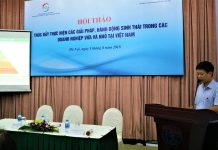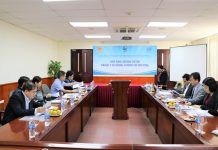On the 6th of April 2023, National Centre of Rural Water Supply and Sanitation (NCERWASS) in collaboration with the United Nations Children’s Fund (UNICEF) organized the Consultation Workshop on assessing the current status, potential and solutions on renewable energy and energy efficiency application in rural water supply in Vietnam.
Reports of GreenDC’s Consultants – the Unit was selected by UNICEF to conduct the study “Assessment of the current status and potential of energy conservation and renewable energy applications in rural water supply” shows that the rural water sector in Vietnam has a lot of potential to apply renewable energy and energy saving solutions.

With more than 7000 centralized water supply projects using conduction pump technology, electricity is the decisive factor for the production and supply of clean water of these schemes.
The main energy-using stage of a water supply project is collection, pumping raw water for treatment and secondary pumping station. The pumping system accounts for about 95% – 98% of the total energy consumption of the building, 2% – 5% of the cost are for lighting systems and other living expenses. The total cost of electricity accounts for 17% – 33% of the total operating costs of most rural water supply projects.

Regarding the application of renewable energy, solar power is considered to be the most reasonable and applicable for rural water supply scheme because of its convenience, moderate investment rate, and suitable for the terrain and actual electricity demand of the scheme.
Regarding energy saving, although most of them are small and medium sized schemes, the energy efficiency potential of rural water supply schemes is quite high, estimated at 15% – 20%. Typical energy efficiency solutions and technologies such as using a converter (variable frequency Drive – VFD) to control the speed of pump, upgrading to high efficiency pumps, implementing management solutions such as schedule appropriate pumping, fix leaks, encourage water-saving behaviors, etc.
Although there is a lot of potential, the energy efficiency and the application of solar power in water supply projects in recent years has not been popular. The reason is that there are still obstacles and inadequacies when implementing RE and EE solutions such as unclear policy mechanisms, lack of investment capital, and limited awareness… The delegates expressed their wish that the State management agencies should issue specific instructions soon, remove obstacles in grid connection for solar power, public asset management, capital to support the construction of pilot models, ODA loans, strengthen capacity and awareness for operators of water supply schemes…







